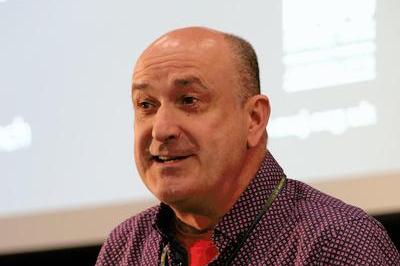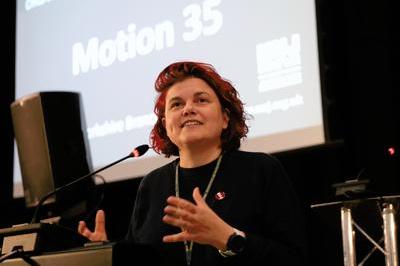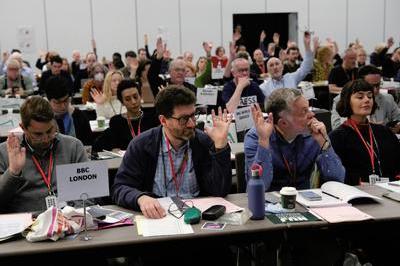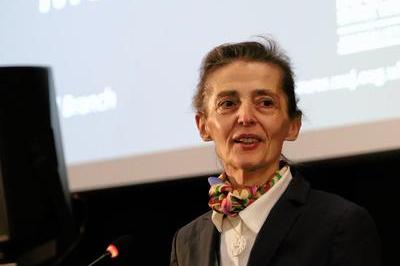DM2025: organisation
Motions on the climate crisis and branch organisation featured in this debate.
Laura Davison, NUJ general secretary, urged support for the motion. “DM notes the UK government’s intention to remove the requirement for certain union elections to be held by postal ballot, thus allowing these elections to be held online rather than by post if the NEC chooses” she said.
The general secretary said this motion was about ballot papers and the delivery of ballot papers, particularly outside the UK. She referenced a situation when fresh ballot papers had to be couriered to some countries.
Members agreed to withdraw the amendment relating to guarantees that ballots reach members in sufficient time to enable their vote to be counted.
The motion was passed.
Motion 18 focused on the Finance Committee, which is exploring alternative subscription models to support the recruitment and retention of the union membership. Caroline Price, London Magazine Branch, urged support and stressed the need for continued engagement with NUJ branches and chapels on subscription fees to build on the membership base.
Chris Frost urged support. He said the difficulties are that subs need to continue to go up, but membership is falling off, and there is ‘need for a good recruitment strategy for new members, so the union expands and grows. Many do not understand what unions are all about, and we need to do that by training them’ he said.
The motion was passed.
Alex MacDonald, London Digital Media, said the motion is about looking into the possibility of attempting to refresh the membership of councils and committees. The motion states, “DM instructs NEC to look at the issue of term limits for itself and other bodies and to report back in time for people to write motions for the next DM.” Simon Barrow, Ethics Council, seconded the motion.
David Nicholson, who opposed the motion, said, “The reality is that we are struggling to get members to be chapel officers, and we are encouraging activists to fill these positions. Surely our energies would be better spent on recruiting new members.” A consultation looking into term limits is a bit of a luxury, he said.
The motion was passed.
The BBC World Service Branch withdrew their motion requiring candidates standing for election to the NUJ’s councils to disclose political party affiliations. Meanwhile the London Digital Media Branch remitted their motion regarding nominations to sectoral seats on NUJ councils and committees.
Motions 24-26 focused on the role and constitution of the union’s industrial councils. Gerry Curran, NUJ vice-president, recently led a membership-wide consultation on the councils, and thanked members for their simultaneously “conflicting” and “inspiring” views.

Gerry Curran.
© Jess Hurd
Motion 24 by the Oxford and District Branch called for an expansion of the industrial councils’ remit so they can better support the union’s recruitment, retention, and organising. This includes creating sector-based WhatsApp groups and collaborating with the NUJ’s communications team to produce recruitment materials, blogs, and campaigns. “The best people to work out what’s needed are the industrial councils themselves”, said Anna Wagstaff speaking on behalf of the Oxford and District Branch. The motion, amended and second by the National Executive Committee (NEC), was carried with a clear majority.
Industrial councils are currently constituted from different sectors (Broadcasting, Freelance, Magazines and Books, New Media, Newspapers and Agencies, PR and Communications). A motion tabled by the London Digital Media Branch called for a membership-wide survey to gauge opinions on replacing industrial councils with task-focused bodies. Matt Capon, representing the branch, stated that doing so would align with the union’s member-led approach.
Tony Sheldon, representing the Netherlands Branch, noted the need for reform of the councils but argued that abolition would be “a self-inflicted wound”. Meanwhile Christina Zaba, representing the New Media Industrial Council, said that an additional survey closely following an extensive consultation would be unnecessary use of members’ time. Delegates rejected the motion.
Motion 25 by the Netherlands Branch called for a survey of branches to ascertain the extent of hybrid working and associated costs. The motion highlighted that whilst in-person meetings worked in some circumstances online or hybrid meetings are ‘vital for the operation of branches which have no single industry focus.’ Delegates passed the motion.
Motion 26 by the Newspaper and Agencies Industrial Council highlighted that current rules effectively exclude representatives from Scotland, Wales and the Republic of Ireland being elected to most industrial councils.
Steve Bird, representing the Financial Times Chapel, and Raj Ford, representing the NEC, spoke in support of the motion on the basis that member democracy and knowledge sharing should not be restricted by geography. Cearbhall Ó Síocháin from the Irish Executive Council (IEC) suggested that there are alternative avenues for greater geographic representation and that this motion would incur additional costs to the NUJ.
Delegates agreed that the NEC should change the rules so that members of the Irish, Scottish, and Welsh executives can participate in industrial council meetings with more seats created to accommodate for additional members.
Motion 34 by Birmingham & Coventry Branch amended by the Continental European Council recognised the importance of branch organisation including in areas such as Continental Europe where there are no chapels, or areas with predominantly freelance membership. Delegates speaking to the motion referenced low attendance in some cases but stressed efforts were underway to change this. Andy Walker from Newcastle Branch, first time delegate, speaking against the motion recognised it was good membership engagement was being discussed at DM. Tony Sheldon speaking on behalf of the NEC, urged delegates to support the motion. The motion was carried.

Katie Hall.
© Jess Hurd
Delegates heard from Katie Hall speaking to motion 35 calling on the NEC to amend the rules, resulting in branches being required to convene an ordinary meeting at least every other month. The motion from Leeds & West Yorkshire Branch amended by Book Branch raised that for some working members the frequency of monthly meetings on committees may make joining one less appealing or impractical. The motion was passed by delegates.
A motion tabled by Book Branch noted the continuing climate crisis and called on DM to commit to continue supporting the right of members to free speech supporting fossil fuel divestment or sustainability initiatives. Tim Dawson, seconding the motion, said the union needed to engage in the process to ensure we don’t cost our members’ jobs but do find ways to save the planet.

© Jess Hurd
Sara Lewis from the Equality Council spoke on the issue of young journalists, gen Z, wanting to engage with experienced journalists. She said there was a need for a ‘Students and Early Career Members’ network, an informal space to share issues and seek peer support’.
Chris Frost urged DM to vote for the motion. The motion was carried.
The London Magazine Branch had tabled a motion highlighting the NUJ’s duty of care to reps and members undertaking union work. Liz Else, representing the branch, remitted the motion after being convinced that the union will take action to maintain staffing levels and alleviate reps’ workloads. Laura Davison, NUJ general secretary, thanked the London Magazine Branch for raising numerous important points as well as lay reps for their committed work to the union.

Rumyana Vakarelska.
© Jess Hurd
The London Central Branch proposed creating a space at the union’s headquarters in London for home-based NUJ members to meet and work. Speaking on behalf of the branch, Rumyana Vakarelska argued that doing so would strengthen previous motions on fostering a culture of community and collegiality. Other speakers supporting the motion included Pennie Quinton from the London Freelance Branch and Jonathan Jewell from the NUJ Health and Safety Committee.
Cearbhall Ó Síocháin from the Irish Executive Committee (IEC) sympathised with the isolated working experienced by many journalists following the COVID-19 pandemic but said that the proposal was not feasible and would be costly. Gerry Curran, NUJ vice-president, similarly noted that the NUJ is not equipped to deal with the business of accommodation provision. Tim Dawson, representing the Freelance Industrial Council, said that operating a co-working space would require a comprehensive business plan.
Kitty Holland from the Dublin Branch suggested that asking all members to fund a café that could only be used members in one location would disenfranchise members in other regions. The motion was remitted.
